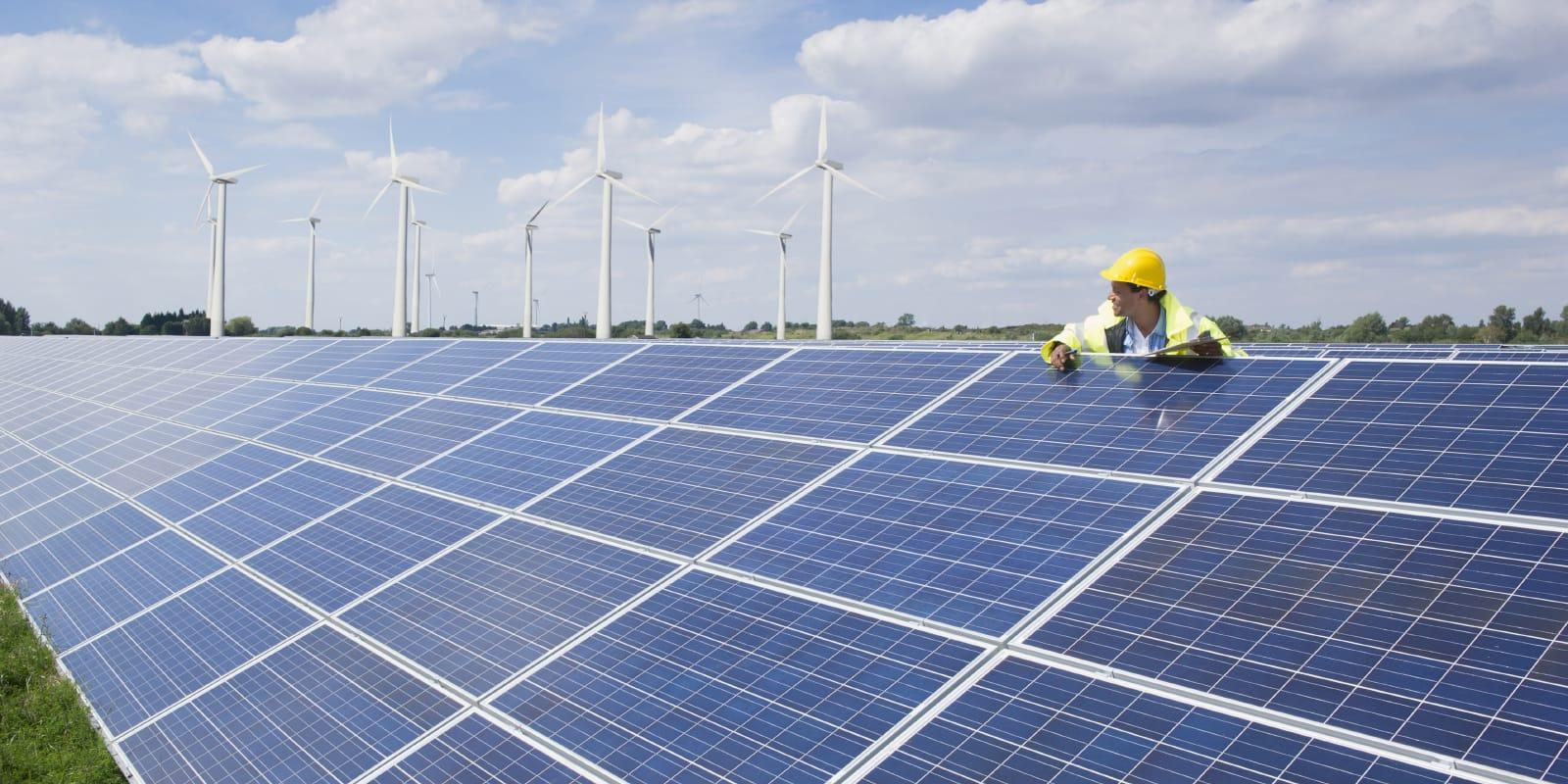
Energy & Sustainability
Viewpoints
Filter by:
Investor Advisory Committee Pushes SEC to Lead on ESG Disclosures
June 1, 2020 | Blog | By Sahir Surmeli, Thomas R. Burton, III
The U.S. Securities and Exchange Commission’s Investor Advisory Committee’s Investor-as-Owner Subcommittee recently voted 14-4 to approve a recommendation that urges the Commission (SEC) to begin an effort to update the reporting requirements of public companies to include material, decision-useful environmental, social, and governance (ESG) factors.
Read more
Republican Senators Request “Start of Construction” Relief Under Sections 45 and 48 for COVID-Related Delays, Including “Continuous Efforts” Rule for Physical Work Projects
May 22, 2020 | Blog
In a May 21 letter to Treasury Secretary Steven Mnuchin, three Republican senators—Senator Lisa Murkowski (R-AK), Senator Susan M. Collins (R-ME), and Senator Thom Tillis (R-NC)—have requested that Treasury modify existing Internal Revenue Service (“IRS”) guidance on “start of construction” to provide production tax credit (“PTC”) and investment tax credit (“ITC”) relief to wind and solar projects affected by COVID-19 related disruptions.
Read more
SBA Issues Additional Guidance Regarding “Necessity” Certification Required under the CARES Act
May 13, 2020 | Blog | By Hope Foster, Karen Lovitch , Joseph Price, Sahir Surmeli
Today the Small Business Administration (SBA) issued additional guidance with respect to the “necessity” certification required under the CARES Act in connection with the Paycheck Protection Program (PPP). The relevant guidance appears in FAQ 46, and it is very good news for borrowers who received PPP loans under $2 million (together with PPP loans to affiliates, if any). The SBA, in consultation with the U.S. Department of Treasury, has determined that a safe harbor will apply with respect to SBA’s review of the certification of necessity in connection with respect to such loans. Specifically, “[a]ny borrower that, together with its affiliates, received PPP loans with an original principal amount of less than $2 million will be deemed to have made the required certification concerning the necessity of the loan request in good faith.”
Read more
US Treasury Indicates Extension of Deadlines for Accessing Wind, Solar Tax Credits
May 8, 2020 | Blog
A letter issued by the Office of Legislative Affairs at the Department of the Treasury Thursday suggests that some relief is on the way for a renewables industry that has been battered by the COVID-19 crisis and has expressed concern about fast-approaching tax credit deadlines.
Read more
MassCEC BRIDGES Program Now Accepting Applications
May 5, 2020 | Blog | By Sahir Surmeli, Thomas Burton
The Bridging Recovery for Innovators Driving Green Energy Solutions (BRIDGES) Program, created by the Massachusetts Clean Energy Center (MassCEC), is currently accepting applications from clean energy startups in need of support in light of the COVID-19 pandemic.
Read more
With Most State Capitols Closed, Some States Press Forward on Clean Energy Legislation
May 1, 2020 | Blog | By Sahir Surmeli, Thomas R. Burton, III
While the COVID-19 pandemic continues to keep most of America home, including state legislators, some states have managed to pass landmark clean energy legislation whilst prioritizing matters related to the novel coronavirus.
Read more
The Transportation and Climate Initiative (TCI): Everything You Need to Know, Part IV: The Challenges to TCI Implementation
March 30, 2020 | Blog | By Sahir Surmeli, Thomas R. Burton, III
In Part III of our series on the Transportation and Climate Initiative, we took a deep dive into one TCI jurisdiction, Massachusetts, to see how the plan might look once implemented. However, the broad implementation of this regional initiative is anything but certain. Despite the steps that some jurisdictions have taken in progressing towards legislation and executive action to implement the plan, many states are facing legitimate challenges that may prevent this regional program from actually going into effect.
Read more
Wireless Charging for Electric Vehicles
March 30, 2020 | Blog
Demand for electric vehicles (EVs) has been growing as more and more models and are coming to market, some from new automakers. One barrier to widespread adoption of EVs is the amount of charging time that is required, especially when using home or other charging systems where users must charge their vehicles overnight to obtain a full charge. This is a technical issue that the industry is in the process of resolving, chiefly by improving upon today’s much-used “plug-in” charging systems.
Read more
An Ambitious New Ban on Gas Vehicles in the U.K.
March 5, 2020 | Blog | By Sahir Surmeli
In early February, the United Kingdom announced a new goal in its efforts to confront climate change: a ban on the sale of all new gas and diesel cars by 2035. The ambitious announcement is set to speed up the country’s timeline for addressing and reducing greenhouse gas emissions by five years, modifying the previous goal of a 2040 ban.
Read more
The Transportation and Climate Initiative (TCI): Everything You Need to Know, Part III: The Plan for Massachusetts
March 2, 2020 | Blog | By Sahir Surmeli, Thomas R. Burton, III
In Parts I and II of our series delving into the details of the Transportation Climate Initiative, we provided an overview and described the structure of the TCI. In Part III, we will discuss how the plan might look in one TCI jurisdiction, Massachusetts, and how the Commonwealth will prioritize investment of the proceeds from the initiative.
Read more
The Transportation and Climate Initiative (TCI): Everything You Need to Know, Part II: How Will TCI Work?
February 4, 2020 | Blog | By Sahir Surmeli, Thomas R. Burton, III
In Part I of our series on the Transportation Climate Initiative TCI, we provided an overview of this innovative program. Here in Part II, we will delve into how the initiative will work. As a regional policy, TCI will provide a framework for each state jurisdiction to implement in its own way. The recently released Framework for a Draft Regional Policy Proposal provides important insights into the way that the TCI could be structured in each state.
Read more
Energy Tax Extenders Passed in Washington
January 8, 2020 | Blog | By Thomas R. Burton, III
On December 17, 2019, the United States House of Representatives voted to pass a $1.4 trillion spending package as an amendment to the Further Consolidated Appropriations Act, 2020 (H.R. 1865). The Taxpayer Certainty and Disaster Relief Act of 2019 amendment, which included several energy-related tax provisions and extensions, was added to the end of the bill and unveiled just days before Congress was set to adjourn for the year.
Read more
The Transportation and Climate Initiative (TCI): Everything You Need to Know, Part I: What Is the TCI?
January 7, 2020 | Blog | By Thomas Burton, Sahir Surmeli
On December 17, 2019, thirteen jurisdictions in the Northeast and Mid-Atlantic United States officially issued an ambitious plan to combat climate change by reducing carbon emissions and investing in sustainable transportation infrastructure. The plan, entitled the Transportation and Climate Initiative (TCI), which has taken nearly a year to be drafted, is the first inter-state initiative of its kind and, if implemented, would drastically change the face of transportation along the East Coast.
In this first installment of a four-part series on the TCI, we will provide a comprehensive overview of the initiative and explain its aims. Subsequent installments will cover the initiative’s structure, the plan for Massachusetts, and potential challenges to implementation.
Read more
In this first installment of a four-part series on the TCI, we will provide a comprehensive overview of the initiative and explain its aims. Subsequent installments will cover the initiative’s structure, the plan for Massachusetts, and potential challenges to implementation.
New York Permits 316 MW Battery Storage Project, Trading Gas Plant for World’s Largest Battery
December 2, 2019 | Blog | By Thomas R. Burton, III, Sahir Surmeli
New York’s utility regulator has approved construction on a 316-megawatt battery storage plant, a facility that, if built, would provide emissions-free power to New York City and the surrounding region while replacing a significant portion of the city’s fossil-fueled energy. Known as the Ravenswood Development, the project aims to provide 2,528 MWh of power and would operate during peak hours, with enough storage capacity to discharge 8 hours of power during the hours of highest demand.
Read more
Offshore Wind Turbine Blade Set to Be Tested in Boston
November 22, 2019 | Blog | By Sahir Surmeli, Thomas R. Burton, III
On November 5, 2019, the Massachusetts Clean Energy Center (MassCEC) and GE Renewable Energy together announced the arrival of a powerful offshore wind turbine blade in Boston.
Read more
Explore Other Viewpoints:
- AI: The Washington Report
- Antitrust
- Appellate
- Arbitration, Mediation & Alternate Dispute Resolution
- Artificial Intelligence
- Awards
- Bankruptcy & Restructuring
- California Land Use
- Cannabis
- Class Action
- Complex Commercial Litigation
- Construction
- Consumer Product Safety
- Corporate Governance (ESG)
- Cross-Border Asset Recovery
- Debt Financing
- Direct Investing (M&A)
- Diversity
- EB-5 Financing
- Education & Nonprofits
- Employment
- Energy & Sustainability
- Environmental (ESG)
- Environmental Enforcement Defense
- Environmental Law
- Environmental, Social, and Corporate Governance (ESG)
- FDA Regulatory
- False Claims Act
- Federal Circuit Appeals
- Financial Institution Litigation
- Government Law
- Growth Equity
- Health Care
- Health Care Compliance, Fraud and Abuse, & Regulatory Counseling
- Health Care Enforcement & Investigations
- Health Care Transactions
- Health Information Privacy & Security
- IP Due Diligence
- IPRs & Other Post Grant Proceedings
- Immigration
- Impacts of a New US Administration
- Insolvency & Creditor Rights Litigation
- Institutional Investor Class Action Recovery
- Insurance & Financial Services
- Insurance Consulting & Risk Management
- Insurance and Reinsurance Problem-Solving & Dispute Resolution
- Intellectual Property
- Investment Funds
- Israel
- Licensing & Technology Transactions
- Life Sciences
- Litigation & Investigations
- M&A Litigation
- ML Strategies
- Medicare, Medicaid and Commercial Coverage & Reimbursement
- Mergers & Acquisitions
- Patent Litigation
- Patent Prosecution & Strategic Counseling
- Pharmacy Benefits and PBM Contracting
- Portfolio Companies
- Privacy & Cybersecurity
- Private Client
- Private Equity
- Pro Bono
- Probate & Fiduciary Litigation
- Products Liability & Complex Tort
- Projects & Infrastructure
- Public Finance
- Real Estate Litigation
- Real Estate Transactions
- Real Estate, Construction & Infrastructure
- Retail & Consumer Products
- Securities & Capital Markets
- Securities Litigation
- Social (ESG)
- Special Purpose Acquisition Company (SPACs)
- Sports & Entertainment
- State Attorneys General
- Strategic IP Monetization & Licensing
- Tax
- Technology
- Technology, Communications & Media
- Technology, Communications & Media Litigation
- Trade Secrets
- Trademark & Copyright
- Trademark Litigation
- Value-Based Care
- Venture Capital & Emerging Companies
- White Collar Defense & Government Investigations
- Women's Health and Technology






